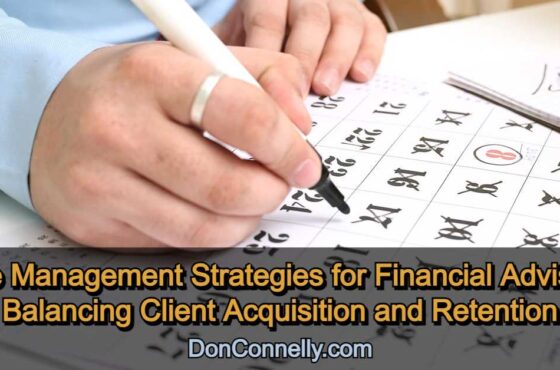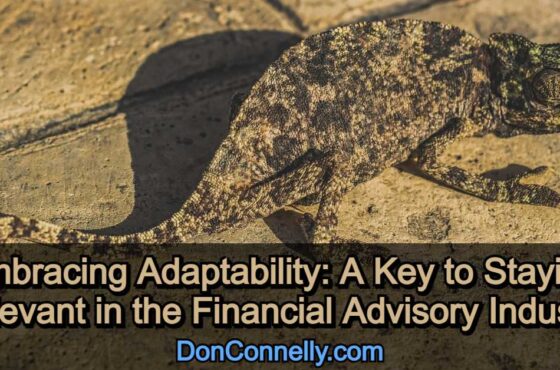Why You Need to Encourage Your Clients to Ask Questions
 As a financial advisor, you occupy a position of trust, guiding clients through complex financial landscapes. While knowledge and experience are crucial assets, an advisor’s success hinges on another critical factor: fostering a culture of open communication where clients feel empowered to ask questions. This often-overlooked attribute can unlock a multitude of benefits, leading to more effective financial planning, stronger client relationships, and, ultimately, a brighter financial future for the client.
As a financial advisor, you occupy a position of trust, guiding clients through complex financial landscapes. While knowledge and experience are crucial assets, an advisor’s success hinges on another critical factor: fostering a culture of open communication where clients feel empowered to ask questions. This often-overlooked attribute can unlock a multitude of benefits, leading to more effective financial planning, stronger client relationships, and, ultimately, a brighter financial future for the client.
Open communication must be a two-way street—starting with you
Encouraging questions opens the door to a deeper understanding of your client’s unique story. The most effective way to encourage questions is by asking them. Clients will take their cue from you and the questions you ask to learn more about their goals, concerns, and aspirations. Your regularly asking questions signals to your clients that it is your preferred means of communication and that they should feel comfortable doing the same.
Empowering informed decisions
The financial world can be intimidating, filled with jargon and ever-changing market dynamics. Clients who are afraid to ask questions may feel pressured to blindly accept an advisor’s recommendations. However, encouraging questions fosters an environment of education and shared decision-making. Clients who ask about investment options, risk assessments, and fees gain a deeper understanding of the “why” behind the advisor’s strategy. This empowers them to make informed choices, fostering a sense of ownership and accountability for their financial future.
Building trust and confidence
A client who feels comfortable asking questions is a client who trusts their advisor. Advisors demonstrate their commitment to transparency and open communication by actively listening to and addressing client inquiries. This builds trust, a cornerstone of any successful financial relationship. Clients who trust their advisor are more likely to be receptive to guidance, adhere to the financial plan, and feel confident navigating future financial decisions.
Identifying knowledge gaps and unrealistic expectations
Financial advisors don’t just manage money; they manage expectations. Client questions can expose unrealistic expectations about investment returns, retirement timelines, or the impact of life events on finances. By addressing these concerns head-on, you can proactively adjust strategies and educate clients on market realities. This prevents future disappointment and strengthens the client relationship by demonstrating your commitment to realistic planning.
Fostering long-term engagement
Financial planning is a continuous journey, not a one-time event. Life circumstances and goals evolve, necessitating adjustments to the financial plan. Clients who are comfortable asking questions are more likely to stay engaged with the planning process. They’ll be proactive in communicating changes in their income, family situations, or risk tolerance, allowing the advisor to adapt the strategy accordingly. This ongoing dialogue ensures the financial plan remains relevant and effective throughout the client’s life.
Addressing client objections and concerns
Client questions can sometimes uncover hidden objections or concerns about an advisor’s recommendations. You can gain valuable insights they might otherwise miss by encouraging open dialogue. These objections can be a springboard for further discussion, allowing you to address the client’s specific needs and tailor the plan for optimal results.
Creating a safe space for vulnerability
Financial matters can be a source of stress and anxiety. Creating a safe space for clients to express their fears and uncertainties fosters a more holistic approach to financial planning. Open communication allows clients to acknowledge emotional attachments to money, discuss past financial mistakes, and voice their anxieties about the future. This level of vulnerability enables you to incorporate emotional well-being into the planning process, leading to a more comprehensive and client-centered approach.
Encouraging client questions: Practical tips
Encouraging a culture of open communication requires a proactive approach. Here are some practical tips:
- Start by asking open-ended questionsthat go beyond yes-or-no answers. This invites clients to elaborate on their goals, concerns, and values.
- Actively listen to client questions without judgment. Pay attention to both the verbal and nonverbal cues to understand the underlying emotions and anxieties.
- Use plain languageand avoid financial jargon. Explain complex concepts in a way that is clear and easy to understand.
- Encourage follow-up questions. Let clients know that there are no wrong questions and that their understanding is paramount.
- Be patient. Building trust and fostering open communication takes time. Be patient with clients who may be hesitant to ask questions initially.
Encouraging client questions is not just a courtesy—it’s a cornerstone of an enduring advisory relationship. By fostering a culture of open communication, you gain a deeper understanding of your client’s needs while empowering them to make informed decisions. A two-way dialogue leads to stronger relationships, more effective financial strategies, and better financial outcomes.
Watch this 3-minute video to learn how our 24-step training program can help you become a better communicator and take your business to the next level.
See program details and enroll today!
Available as a self-paced program (always open) or as a 12-week coaching program (open only a couple of times a year), this training will change the way you view your practice and will give you an enormous advantage over your competition. Select your format and enroll now!



